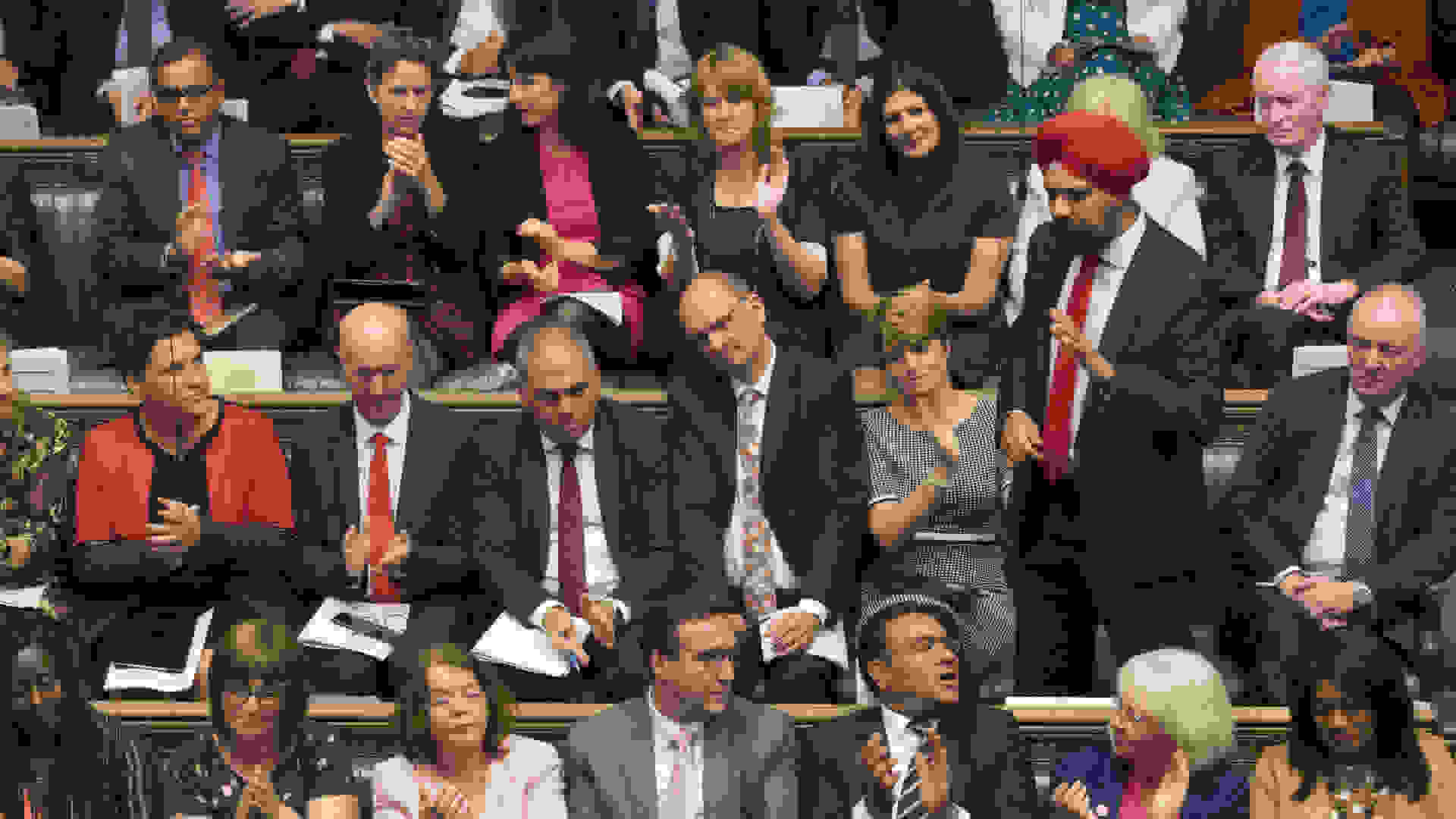Why are Private Members' Bills debated on a Friday?
Tue. 3 May 2022
Thirteen Friday sittings are set aside in the House of Commons each session for consideration of PMBs, signifying a commitment to provide some freedom from the normal constraint that 'Government business shall have precedence at every sitting' (Standing Order No.14(8)). Unless the House decides otherwise, these are the only Friday sittings held each session.

, Director
Dr Ruth Fox
Dr Ruth Fox
Director , Hansard Society
Ruth is responsible for the strategic direction and performance of the Society and leads its research programme. She has appeared before more than a dozen parliamentary select committees and inquiries, and regularly contributes to a wide range of current affairs programmes on radio and television, commentating on parliamentary process and political reform.
In 2012 she served as adviser to the independent Commission on Political and Democratic Reform in Gibraltar, and in 2013 as an independent member of the Northern Ireland Assembly’s Committee Review Group. Prior to joining the Society in 2008, she was head of research and communications for a Labour MP and Minister and ran his general election campaigns in 2001 and 2005 in a key marginal constituency.
In 2004 she worked for Senator John Kerry’s presidential campaign in the battleground state of Florida. In 1999-2001 she worked as a Client Manager and historical adviser at the Public Record Office (now the National Archives), after being awarded a PhD in political history (on the electoral strategy and philosophy of the Liberal Party 1970-1983) from the University of Leeds, where she also taught Modern European History and Contemporary International Politics.
Get our latest research, insights and events delivered to your inbox
Share this and support our work
Cumulatively, 13 sitting Fridays amounts to 65 hours of parliamentary time for consideration of PMBs each session, each Friday sitting being five hours in length (9.30am-2.30pm).
This time can be encroached upon by petitions, Urgent Questions, Points of Order to the Speaker, and government statements.
A few additional sitting Fridays may be provided if the Session is of extended length (as for example in the 2010-12 and 2017-19 Sessions).
The government can make additional time available other than on Fridays to facilitate discussion of a PMB if it wishes, but it is rare for it to do so.
After a bill is introduced at First Reading, the Speaker will ask the MP 'Second Reading what day?'
The MP must name an available Friday sitting day. The first seven of the 13 sitting Fridays are set aside for Second Reading of Ballot Bills: those MPs who secured the top seven places in the ballot thus have the first choice of dates.
Guides / What is a Ballot Bill?
At the start of a new parliamentary Session backbench MPs can enter the PMB ballot. The 20 MPs whose names are drawn may bring in a Bill of their choice. Ballot Bills have the best chance of becoming law because they have priority over other PMBs when time is allocated for debates.
MPs outside the top seven are likely to be listed second or third on the Order Paper on the Friday that is chosen, and their bills will therefore have less chance of being debated.
The remaining 8th to 13th sitting Fridays are dedicated to consideration of those PMBs that have made most progress.
The 13th and final sitting Friday allotted for PMBs - colloquially known as the 'slaughter of the innocents' on account of its attrition rate - is largely taken up with Lords amendments.
At this point, a complex order of precedence dictates which bills can make use of the remaining time. This order of precedence includes:
consideration of Lords amendments;
Third Readings;
new Report stages;
adjourned Report stages;
adjourned Committee proceedings;
bills appointed to Committees of the Whole House; and
Second Readings.
A backbencher can also lay down a PMB for consideration on any non-sitting Friday.
In the event that sitting days are extended (as happened in the longer-than-usual 2010-12 session) then the PMBs on the Order Paper for these new sitting days have priority.
More
Related
Guides / What is a Ballot Bill?
At the start of a new parliamentary Session backbench MPs can enter the PMB ballot. The 20 MPs whose names are drawn may bring in a Bill of their choice. Ballot Bills have the best chance of becoming law because they have priority over other PMBs when time is allocated for debates.
Guides / What is a Presentation Bill?
Any MP is permitted under Standing Order No. 57 to introduce a bill of his or her choice, having given prior notice to the Public Bill Office. Presentation Bills are formally 'presented' during a Friday sitting, and only after all the Ballot Bills on the Order Paper have been presented.
Guides / What is a Ten Minute Rule Bill?
Ten Minute Rule Bills are essentially policy aims put into legislative language in order to secure a 10-minute speaking slot during 'primetime' in the House of Commons Chamber after Question Time on Tuesdays and Wednesdays (but not on Budget day).
Guides / Why are Private Members' Bills debated on a Friday?
Thirteen Friday sittings are set aside in the House of Commons each session for consideration of PMBs, signifying a commitment to provide some freedom from the normal constraint that 'Government business shall have precedence at every sitting' (Standing Order No.14(8)). Unless the House decides otherwise, these are the only Friday sittings held each session.
Guides / What is a Private Members' Bill?
Private Members' Bills (PMBs) are bills introduced by MPs and Peers who are not government ministers. They provide backbenchers with an opportunity to address public concerns and to set a policy agenda that is not determined by the executive. But the procedures, often a source of controversy, are different to those that apply for government bills.
Publications / Opening up the Usual Channels: next steps for reform of the House of Commons
In a speech to the Hansard Society on 11 October 2017, of which the full text and audio recording are below, the House of Commons Speaker, the Rt Hon John Bercow MP, proposed three key reforms for the House: a House Business Committee; reforms to procedures for Private Members' Bills; and a loosening of the government's exclusive control over recalling the House.
Latest
Guides / Financial Scrutiny: the Budget
In order to raise income, the government needs to obtain approval from Parliament for its taxation plans. The Budget process is the means by which the House of Commons considers the government’s plans to impose 'charges on the people' and its assessment of the wider state of the economy.
Guides / Financial Scrutiny: the Estimates Cycle
In order to incur expenditure the government needs to obtain approval from Parliament for its departmental spending plans. The annual Estimates cycle is the means by which the House of Commons controls the government’s plans for the spending of money raised through taxation.
Data / Coronavirus Statutory Instruments Dashboard
The national effort to tackle the Coronavirus health emergency has resulted in UK ministers being granted some of the broadest legislative powers ever seen in peacetime. This Dashboard highlights key facts and figures about the Statutory Instruments (SIs) being produced using these powers in the Coronavirus Act 2020 and other Acts of Parliament.
Briefings / The Economic Crime (Transparency and Enforcement) Bill: four delegated powers that should be amended to improve future accountability to Parliament
The Bill seeks to crack down on ‘dirty money’ and corrupt elites in the UK and is being expedited through Parliament following Russia’s invasion of Ukraine. This briefing identifies four delegated powers in the Bill that should be amended to ensure future accountability to Parliament.
Articles / Brexit and Beyond: Delegated Legislation
The end of the transition period is likely to expose even more fully the scope of the policy-making that the government can carry out via Statutory Instruments, as it uses its new powers to develop post-Brexit law. However, there are few signs yet of a wish to reform delegated legislation scrutiny, on the part of government or the necessary coalition of MPs.